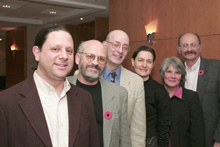New book explores the Canadian Jewish experience

Seen at the launch of the Canadian Jewish Reader at the Jewish Public Library are, from the left, Norman Ravvin, Richard Menkis, Ira Robinson, Rebecca Margolis, Marlene Bonneau and Morton Weinfeld, from McGill.
Photo by Andrew Dobrowolskyj
Norm Ravvin hands out photocopies of Canada’s new $100 bill to the lunchtime gathering at the McGill Institute of Canadian Studies, drawing their attention to four lines of minute writing on the note.
It’s the closing verse, in the original English and the French translation, of the poem “Jacques Cartier in Toronto” by Miriam Waddington, one of Canada’s leading poets, who died earlier this year.
Do we ever remember that somewhere above the sky in some child’s dream perhaps.
Jacques Cartier is still sailing, always on his way always about to discover a new Canada?
But Ravvin, writer, critic and chair of Concordia’s Institute for Canadian Jewish Studies, is not interested in the poem’s use in the bill’s theme of celebrating Canadian innovation and exploration through mapping.
He juxtaposes it to a Waddington essay fondly recalling Montreal’s Yiddish-speaking literati in the 1930s, “Mrs. Maza’s Salon,” which appears in the new Canadian Jewish Studies Reader that Ravvin co-edited with Richard Menkis, an associate professor of Jewish history at the University of British Columbia.
“We wanted to bridge the gap between the Miriam Waddington of the $100 bill and the Canadian government representation of her (on the Bank of Canada website) and the Miriam Waddington rooted in Yiddish language and culture,” Ravvin said.
The Waddington item is among the multidisciplinary essays and excerpts drawn from published and unpublished sources that make up the book, the third in a series devoted to Canadian Jewish studies co-published by Red Deer Press and the Concordia institute and edited by Ravvin.
(The previous books were Not Quite Mainstream: Canadian Jewish Short Stories, edited by Ravvin, and Mordecai and Me: An Appreciation of a Kind, by Joel Yanofsky.)
Canadian Jewish studies is a relatively young field compared with its American equivalent. Using a cultural studies approach, the Reader aims to demonstrate the research and thinking taking place in this country about Jewish identity in such areas as literature, visual arts, historical writing, feminist research and urban geography.
Variety
Ravvin says variety was the editors’ guiding idea, and while the collection contains scholarly pieces, every attempt was made “to have good reads” and “to tell histories that have been neglected.”
For example, there’s an essay on the anarchist event known as the Yom Kippur Ball that took place in Montreal in 1905, well after similar demonstrations had faded in the larger centres of New York and London. Another study looks at the conflict that arose between Jews and Afro-Canadians in 1993 over an attempt to stage the musical Showboat in Toronto.
Ravvin says the editors “resisted the tendency to overplay Montreal.” So there are pieces on the vanished Jewish history of Toronto’s Spadina Avenue and Prairie farming communities, as reconstructed in the literary imagination of such authors as Matt Cohen and Eli Mandel.
The collection includes the story of a painting by internationally known muralist Arnold Belkin that is languishing in storage in his native Vancouver.
Calgary-born Ravvin, who has been chair of the Institute for Canadian Jewish Studies since it was founded in 1999, admits that he is still a Westerner at heart. That, and the fact that co-editor Menkis is Vancouver-based, likely influenced the choice of works in the collection. “My view of the major centres is more ironic, or suspicious,” Ravvin said. “I am very devoted to stories of the West.”
Ravvin, 41, who thinks of himself as “an all-purpose literary writer,” is the author of the novels Café des Westens and Lola by Night; a story collection, Sex, Skyscrapers, and Standard Yiddish; and the essay collections Hidden Canada: An Intimate Travelogue and A House of Words: Jewish Writing, Identity and Memory.
He is currently completing another collection of short stories and working on another novel.